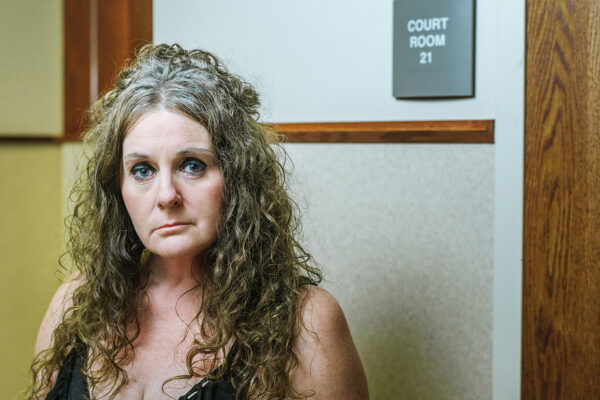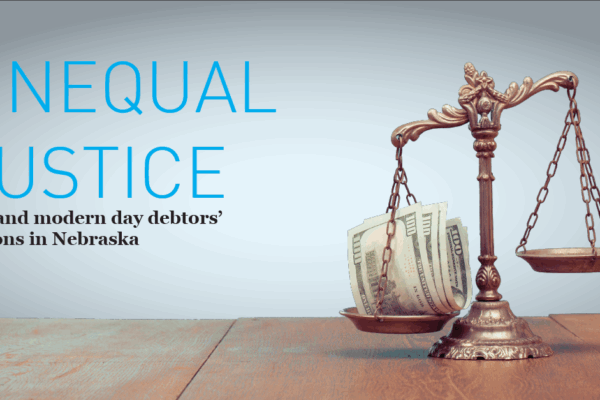Janet Vashon is a 46-year-old woman who was recently experiencing homelessness. These painful life circumstances prompted her to seek charity through panhandling to help her cover her most basic needs. While peacefully asking for help in Lincoln she was arrested, handcuffed, and jailed for this activity by Lincoln Police. Her arrest started her journey into a criminal justice system that trapped her in a maze of no escape.
Janet Vashon is one of the 12.6% of Nebraskans who are living in poverty. Her heartbreaking personal story is highlighted in the groundbreaking ACLU of Nebraska’s investigative report, Unequal Justice. The report details how our criminal justice system piles on fines and fees that punish the poor for being poor despite the fact that the law and the US Constitution prohibits these practices. More than 30 years ago, the U.S. Supreme Court made it clear in Bearden v. Georgia that judges cannot send people to jail just because they are too poor to pay their court fines. Nebraska law and recent guidance from the Department of Justice strengthen these protections.
“This is the first time I’ve ever hit rock bottom," Janet said after meeting with the ACLU of Nebraska, who has stepped forward to fight her criminal case on First Amendment grounds while also working to reform Lincoln's ordinances which criminalize poverty.
"It’s been a hard couple of months. I’m living in my car while some social workers are helping me apply for benefits.” In September, 2016, Janet and a friend decided to stand by the side of the road with signs reading “Homeless, anything will help.”
“I’d seen other people doing it,” Janet says. “I was scared and embarrassed but I was out of options and thought I’d try anything.”
However, like many other people experiencing homelessness, Janet's story continued down a bumpy road.
Lincoln Police arrested Janet under a city ordinance prohibiting soliciting donations in the right-of-way. “When the officer pulled up, I thought he was going to tell me to move on,” said Janet. “But he arrested me. He actually put handcuffs on me and put me in the back of his car to take me to jail. When they booked me, one officer told another “She’s transient, no address to list.” This was the first time that word had ever been applied to me and it just hit me like a ton of bricks. I couldn’t stop crying.”
Janet was told she could leave if she could post $1,000—at 10%, that means she could go free if she had $100. “I didn’t have $100! That’s why I was standing on the corner in the first place,” she exclaims.
For Janet and too many other Nebraskans, court fines and fees create a maze with a dead-end at every turn. The ACLU of Nebraska investigation in the summer and fall of 2016 found that over half of the people in Nebraska’s four largest jails were being held pretrial and had not been convicted of a crime. They simply could not afford to bail themselves out. Some other highlights from our investigation:
- Over 5 in 10 people who could not pay bail are people of color.
- Over half of those in jail because they cannot bail out are accused of nonviolent offenses.
- Courts across the three counties we observed for 50 hours over four months routinely failed to ask about ability to pay when imposing a fine.
- The average nonviolent offender in jail when we surveyed had been sitting in jail for 48 days. Not because they had been convicted of a crime—only because they couldn’t pay bail.
- The four largest counties in Nebraska plan to spend over $73 million on their FY2017 jail budgets.
Lawsuits and policy reform initiatives have taken place around the country to end the unfair jailing of low-income people. In many states, the ACLU has both worked independently and partnered with organizations such as The Department of Justice to bring much-needed reforms to local jails and courts.
With the release of Unequal Justice, the ACLU is calling on county officials, courts, and other stakeholders to reform bail practices in Nebraska as well as the fines and fees that lead to modern-day debtor’s prisons. First and foremost, we need our courts to only require bail if someone is a true risk to public safety or a true flight risk. Next, courts should inquire about the person's ability to pay before imposing a fine.
Ultimately, Janet Vashon was able to call her mother and have $100 posted to be released from jail. “My court date was three weeks after my arrest," she said. "They would have kept me in jail that whole time if my mother hadn’t come through for me. Not everybody has resources. How does this even make sense?”
Many are not as fortunate as Janet Vashon, which is why the ACLU is working to bring attention to these issues prior to exploring litigation to ensure that in our criminal justice system the size of your wallet doesn’t determine the justice you receive.




